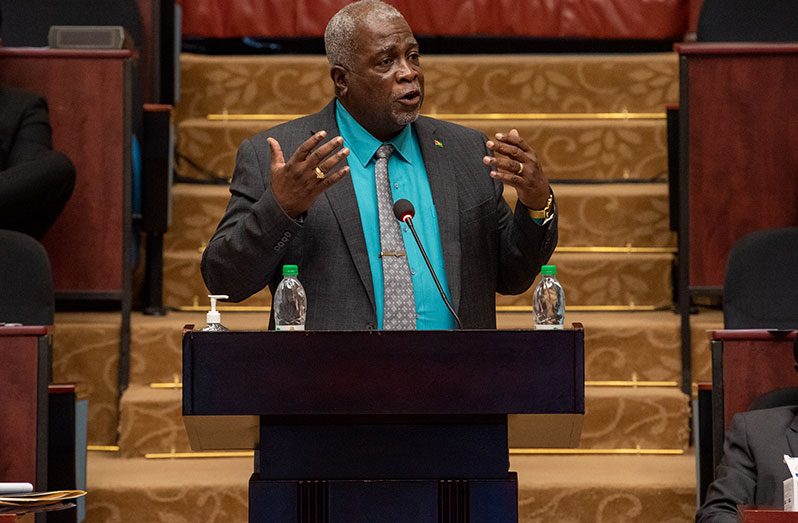–PM says as he talks up gains in telecoms sector, eases concerns
THE government has pursued several initiatives to facilitate a more competitive telecommunications environment and Prime Minister Brigadier (Ret’d) Mark Phillips has assured Guyanese that better cell and internet services can be expected from this year.
The Prime Minister said this while addressing several concerns raised by Opposition Parliamentarian and Former Minister of Public Telecommunications, Catherine Hughes, during the Budget Debates on Friday night.
“Through the act of liberalising the telecommunications sector, all we are interested in, on this side of the House, is a better deal for the people of Guyana — better service at the best price for all the people of Guyana,” the Prime Minister said.
And he emphasised, “I wish to assure this House and the people of Guyana that the Public Utilities Commission (PUC) will be engaged and will be asked to pay more attention to the quality of the telecommunications sector in 2022 in Guyana.”
For context, the PUC functions as a regulatory, investigatory and enforcement body. As per the PUC Act, the body has the power to initiate and conduct investigations into the operations and standards of services offered at any public utility under its purview.
And last month, the Guyana Chronicle reported that the Guyana Telephone and Telegraph Company (GTT) racked up the most consumer complaints at the PUC, and most were resolved.
Responding to questions on what GTT is doing to address its continuous position as the company with the most complaints, GTT Chief Executive Officer (CEO), Damien Blackburn, noted that the majority of the complaints against the company had to do with its DSL internet service.
According to Blackburn, the company is trying to directly address this by expanding the coverage of its alternative and upgraded fibre network, and getting more customers to switch to that service from the DSL.
As the company strived to improve services, the Prime Minister assured Guyanese that better service will be provided in 2022. This, he explained, is possible because the liberalised sector has resulted in more companies offering services similar to GTT. Due to the nature of business competition, overall quality is expected to increase over time.
In 2020, within two months of assuming office, the People’s Progressive Party/ Civic (PPP/C) Government liberalised the telecommunications sector essentially ending the longstanding dominance of GTT.
The liberalisation paved the way for completion and expansion of services. Since then, one key improvement has been that other companies have been able to bring fibre optic cables to connect Guyana to the internet.
On Friday, the Prime Minister- who issued the commencement order for liberalisation in 2020 — said that the former minister benefited from the same technical advice he did. And, he said that Hughes could have liberalised the sector long before.
COMPENSATION?
Hughes, during her presentation earlier on Friday, said that the A Partnership for National Unity+Alliance For Change (APNU+AFC) government was close to finalising a settlement agreement with GTT.
That settlement agreement, she contended, would have allowed GTT to comfortably relinquish its monopoly on the local telecommunications sector. The agreement could have included GTT’s claims for some compensation since they would have been, essentially, allowing competitors to do business in an environment they largely controlled.
“… the Former Minister came to this House today and started to talk about issues of compensation for GTT when she knew fully well that the issue of compensation did not arise since GTT voluntarily complied with all the provisions of the law as we issued the commencement order,” the Prime Minister said.
“… She certainly demonstrated a fundamental misunderstanding of this whole issue of the liberalisation of the telecommunications sector,” he said, further adding that it was the People’s National Congress (PNC) government that provided that monopoly to GTT in the first place.
The PNC Reform is the largest constituent of the APNU party. In 1990, the PNC government issued a licence to Atlantic Tele-Network (ATNI), GTT’s parent company, to provide domestic and international voice and data services in Guyana on an exclusive basis until December 2030. This allowed the company to secure its market dominance.
Looking ahead, the Prime Minister said that people are expected to benefit from even more improvements in the sector. Another mobile service operator was licensed and is expected to commence operations in 2022. This means that there would be four mobile service operators in Guyana.
Previously, the Prime Minister explained that liberalisation would result in greater interest and investments in Guyana by new telecommunications operators, Internet service providers, Data Centres, Call Centres, and Business Process Outsourcing (BPO) operations.




.png)









